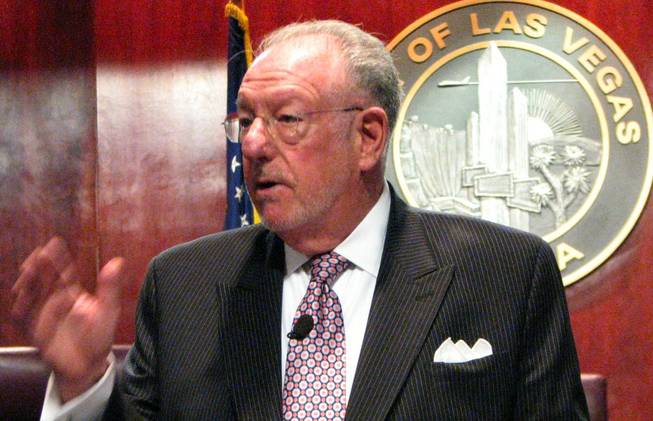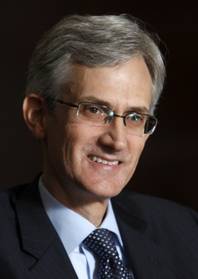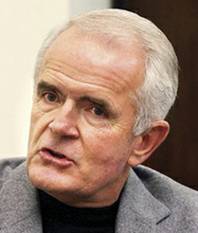
Las Vegas Mayor Oscar Goodman said on Jan. 7, 2010, that the 8 percent salary and benefits cut the city’s so-called elective and appointive employees have agreed to take in lieu of layoffs won’t take effect unless the city’s employees represented by union contracts agree to do the same.
Sunday, Jan. 10, 2010 | 2 a.m.
Sun archives
- County lays off 67 workers, mostly building inspectors (1-8-2010)
- Las Vegas mayor calls on city employee unions to reopen contracts (1-7-2010)
- Report: Nevada public employees among highest paid in country(1-6-2010)
- Gibbons seeking overhaul of state education system (1-6-2010)
- Las Vegas City Council OKs 8 percent salary, benefits cut (1-6-2010)
- Commission Chairman Rory Reid unveils cost-cutting plan for county (1-4-2010)
- Clark County cost-cutting ideas center on salaries (12-30-09)
- Mayor: Morale not good among LV city employees (11-19-2010)
- Las Vegas to lay off 19 city employees as part of budget cuts (11-18-2010)
- Las Vegas officials seek public input on budget cuts (11-6-2009)

Rory Reid

Gov. Jim Gibbons
When Gov. Jim Gibbons suggested eliminating collective bargaining rights as part of an ambitious education reform proposal last week, he launched the latest attack on a group that’s shaping up to be this year’s political target: public employee unions.
Days before, Clark County Commission Chairman Rory Reid, a Democrat running for governor, called the county’s union contracts unsustainable and said negotiators would seek to rein in generous pay and benefits this year.
Las Vegas Mayor Oscar Goodman, who’s mused about running for governor as an independent, said the collective bargaining process had “created a monster” and called on city employees — union and nonunion alike — to take an 8 percent pay cut in each of the next two years.
In Nevada and across the country, growing deficits and a sluggish economy are emboldening local, county and state officials to challenge public employee unions, once thought to be virtually untouchable because of their political muscle come election time. Labor experts say the recession and record unemployment has hardened public — and political — sentiment against public sector unions.
The showdown is the inevitable result of decades of organizing public employees while private-sector unionization numbers were in free-fall, said Janice Fine, a labor relations expert at Rutgers University. According to the Labor Department’s Bureau of Labor Statistics, government workers are nearly five times more likely to belong to a union than private sector workers.
“It’s easy to target public-sector workers in these economic times — and it will only get easier,” Fine said. “It gets harder and harder for private-sector workers to want to defend wages and pensions and benefits of public-sector workers when they look at their own and see them disappearing.”
Here, the unions also battle the perception that they do much better than their colleagues nationwide. For example, the average firefighter in Nevada makes nearly $95,000, or 48 percent more than the national average, according to data compiled and analyzed by the Sun last year. Local police officers make nearly $79,000, or 30 percent more than the national average.
Nevada labor leaders say their unions are being targeted unfairly, especially because their members make up the workforce of the leanest government in the country. Workers, they say, are compensated well but must do the jobs of many, at a time when demand for public services is at an all-time high.
Danny Thompson, executive secretary-treasurer of the Nevada AFL-CIO, said the attack on unions is a wholesale deflection from the failure of the state’s elected leaders to diversify the tax base.
“If you did away with collective bargaining it wouldn’t solve the problem,” he said. “You would still have a tax base that’s reliant on one group of people: gaming.”
Still, unions seem to realize that after decades of winning generous pay and benefits for their members, the economy has eroded their leverage. Experts say public employee unions have to walk a fine line as they negotiate new contracts and reopen existing ones.
Reaching ‘the boiling point’
Defenders and critics of public-sector wages and benefits see the same cause for the current scrutiny: Those in the private sector are suffering, while public workers seem untouched by the recession.
“Times are really tough. People are losing their jobs,” said John Oceguera, the Democratic Assembly majority leader who is also a North Las Vegas assistant fire chief. “One of the stable jobs out there is public employment. People who are without sometimes look at folks who are with, and there’s some sense (of), ‘why are they still working and employed, and I’m not.’ ”
Asked whether public employee contracts should be renegotiated, he said, “We have to look at everything. What services are provided, wages and benefits, what kind of efficiencies we can find.”
(Oceguera is in management, and not a member of the North Las Vegas fire department union.)
Thom Reilly, the Clark County manager between 2001 and 2006, said there’s clearly public unrest over government employee wages and benefits.
“In every analysis, the public sector has exceeded the private sector when you look at wages and benefits. In terms of fairness and equity, we’re out of balance,” Reilly said. “This is not just Las Vegas; this is brewing all across the United States. This is coming to the boiling point between unions and local governments.”
Reilly, who is head of the Harrah’s Foundation and a professor at San Diego State University, said he is collecting data on how the top 150 counties and top 150 cities are handling budget deficits.
“They’re either raising taxes or cutting services,” he said. “They’re not reducing wages.”
That means layoffs. Layoffs mean fewer people left to do government’s work. And that means fewer services for the public, while those public employees who are left remain largely unaffected.
State lawmakers, Reilly said, need to reform collective bargaining laws. If not, he believes citizens will take direct action with ballot initiatives.
But Rusty McAllister, president of the Professional Firefighters of Nevada, said changes in the state’s collective bargaining law aren’t needed because lawmakers tackled the issue in the 2009 session.
Legislators set a minimum number of meetings before labor and management can declare an impasse. In addition, if negotiations go to arbitration, the arbitrator must use like-sized departments in similar communities to evaluate offers and consider the ability of the government to pay a multiyear contract, he said.
Politically dangerous
As the CEO of Clark County government, Reilly for years argued that contracts given to public employees, with salary increases on top of “cost-of-living increases,” merit pay, longevity pay and expanded benefits, were untenable.
“Every year I took out my chart and argued that we cannot sustain salaries that doubled the Consumer Price Index increases,” Reilly said.
But the county and other local governments faced the politics of Carson City, where public employee labor lobbyists, particularly the firefighters and police unions, have a strong hand.
Take, for example, this point: The Legislature has granted local government employees the right to collectively bargain while withholding that right from state workers. Instead, state employees are told if and how much their salaries will increase by the Legislature.
(If state workers did have a contract, the Legislature would almost certainly not have been able to institute the furloughs it approved last year, which cut salaries by 4.6 percent and saved $333 million over two years.)
Reilly said state lawmakers could not budget with the rules they have set for the local governments.
Still, he said, legislators have called him during stalled county contract negotiations to try to influence him on behalf of their union supporters. Committee chairs, he added, threatened to hold up or defeat county bills in the Legislature because of tense contract negotiations. He declined to name the lawmakers.
But local government officials, who ultimately must approve the agreements, also bear some of the blame.
County commissioners and city council members have been eager for the endorsements of firefighters and police. Unions, including general employee unions, are also a source of campaign donations and volunteers to knock on doors, critical keys to victory in low-turnout local elections.
Elected officials have clashed with public employee unions. But those standoffs have brought consequences most politicians wouldn’t welcome.
In 2005, the union representing Metro Police officers was negotiating a contract with the city of Las Vegas and Clark County. The union wanted an increase of more than 25 percent in pay and benefits over four years, and had the backing of most City Council members and Sheriff Bill Young.
A majority of Clark County commissioners resisted, though, including Reid. The case went before an arbitrator, who sided with the county. Under state law, the arbitrator turned to the last and best offer from the county — a contract that amounted to an increase of more than 21 percent in personnel costs over four years.
The police union was not happy, and in particular targeted Republican Commissioner Lynette Boggs. The union believed she had sought support from the Las Vegas Review-Journal editorial board during negotiations, said David Kallas, who was then executive director of the Police Protective Association.
The union hired a private investigator who, after months of surveillance, emerged with damning video of Boggs living outside her district. Images of her picking up a newspaper from her driveway in a pink robe and taking out the trash played again and again on local news. Boggs lost re-election to a little-known Democratic candidate, Susan Brager.
Perhaps emboldened by such past union victories, Clark County firefighters have been defiant in response to management requests for wage concessions. (The average salary and benefits for the county’s 700 firefighters totals just under $200,000 per year.)
More than a year ago, the county asked the union to consider salary concessions to help alleviate the county’s shortfall. The county is facing a $126 million deficit next year, on top of this year’s $70 million deficit.
County administrators and commissioners said the union’s offer amounted to no concession at all.
SEIU made concessions
Kallas, who retired last year as the Las Vegas Police Protective Association lobbyist, sees the increased scrutiny of public employees as an extension of a campaign that groups such as the Greater Las Vegas Chamber of Commerce began waging last session. With the state short on tax revenue, the group tried to focus the debate on public employees’ wages and benefits to distract from the fact that most businesses in Nevada don’t pay their fair share in taxes, he said.
“This is truly about a philosophy,” Kallas said. “These groups see an opportunity to take advantage of.”
Last session, the Chamber of Commerce developed a list of reforms of public employee collective bargaining and retirement benefits. Republicans — two of whom were needed in the Senate to pass a tax increase — adopted those demands as a condition of their support for any tax increase.
With the Legislature facing a $2.5 billion budget hole in 2011 and the inevitability that taxes will be part of the discussion, the field is being set for public employee benefits to once again be on the table.
Last week, the Las Vegas Chamber of Commerce released its second study in a year on the salaries of Nevada public employees. The study, which concluded the salaries are the sixth-highest in the nation, could fuel political momentum to change laws governing public employee unions.
“Public-sector unions have to present themselves as concerned and as partners with government in solving these fiscal crises,” said Fine, the Rutgers labor expert.
The Service Employees International Union, which represents about 9,500 county workers, seems to fit the model. Last year, the union reopened its contract with the county and agreed to lower cost-of-living increases, amounting to $15 million, according to SEIU President Al Martinez. The union also held focus groups and offered the County Commission a list of 200 cost-cutting ideas.
The SEIU begins talks for a new contract next month.
“We will be realistic with our demands and the standards we want to maintain,” Martinez said. “We will also remind the county that we’ve already made concessions.”
Michael J. Mishak can be reached at 259-2347 or at michael.mishak@lasvegas sun.com. David McGrath Schwartz can be reached at 775-687-4597 or at [email protected].

Join the Discussion:
Check this out for a full explanation of our conversion to the LiveFyre commenting system and instructions on how to sign up for an account.
Full comments policy